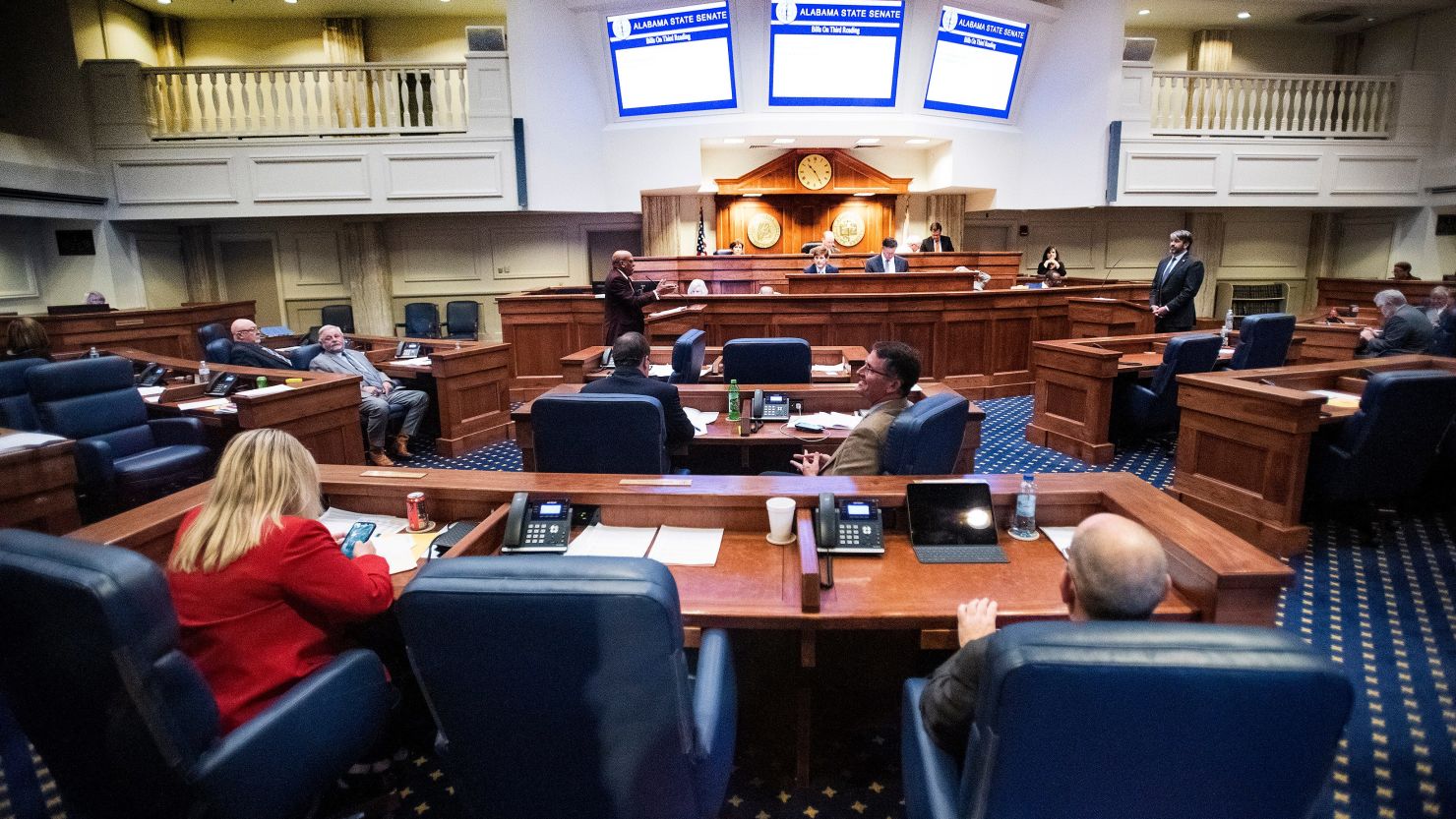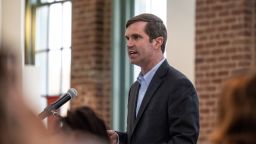Alabama’s Republican-controlled legislature passed two bills on the last day of the session targeting transgender children, including one which makes it a felony for a doctor to administer gender-affirming health care to minors.
Another bill, which requires K-12 students to use bathrooms designated for their biological sex, included a last-hour amendment Thursday critics have compared to similar legislation in Florida dubbed the “Don’t Say Gay” law. It would ban classroom discussions about sexual orientation and gender identity in elementary schools.
The state’s House of Representatives also approved SB 184, which would make it a class C felony for medical professionals to provide gender-affirming care – such as hormone therapy, puberty blockers and gender-reassignment surgery – to people 18 and younger.
Republican Gov. Kay Ivey signed the bills into law Friday.
“There are very real challenges facing our young people, especially with today’s societal pressures and modern culture. I believe very strongly that if the Good Lord made you a boy, you are a boy, and if he made you a girl, you are a girl. We should especially protect our children from these radical, life-altering drugs and surgeries when they are at such a vulnerable stage in life. Instead, let us all focus on helping them to properly develop into the adults God intended them to be,” she said, according to a statement from her press office.
Senate Bill 184 states medical professionals who provide gender-affirming care could face up to 10 years in prison.
“The decision to pursue a course of hormonal and surgical interventions to address a discordance between the individual’s sex and sense of identity should not be presented to or determined for minors who are incapable of comprehending the negative implications and life-course difficulties attending to these interventions,” the bill reads.
The legislation would also make it a violation for public or private school officials, such as teachers, principals, nurses and counselors to encourage a minor to withhold from their parent or guardian “the fact that the minor’s perception of his or her gender or sex is inconsistent with the minor’s sex.”
The bill, dubbed the Alabama Vulnerable Child Compassion and Protection Act, passed the Republican-controlled House following a 66-28 vote, according to the state legislature’s website. The GOP-led Senate passed the bill 24-6 in February, and it will become law 30 days after the governor’s signature.
Alabama would be the latest state to enact such a measure. Last year, Republican lawmakers in Arkansas overrode a veto from their governor to put their own health care ban on the books, and Tennessee and Arizona have passed similar bans.
The American Civil Liberties Union (ACLU) sued Arkansas over its ban last year, and in July, a federal judge temporarily blocked the state from enforcing the law.
The ACLU, the ACLU of Alabama and other legal advocacy groups announced plans to file a legal challenge to the bill.
“Our representatives have been hearing from medical experts, parents, transgender youth, and other advocates for the past three years in an attempt to stop this harmful bill from passing. But despite this strong opposition, the Legislature seems determined to move ahead with this shameful effort to prevent parents and kids from deciding the best course of treatment for themselves,” said Kaitlin Welborn, staff attorney for the ACLU of Alabama. “If the state moves forward in passing this unconstitutional bill, we’ll see them in court.”
Transgender students bathroom bill passed
Later, the legislature passed a bill requiring K-12 students to use bathrooms designated for their biological sex.
House Bill 322 also includes a late amendment banning classroom discussions or instruction about sexual orientation and gender identity in elementary schools.
An original version of the bill sought “to require public K-12 schools to designate the use of rooms where students may be in various stages of undress upon the basis of biological sex.”
Just before the final vote Thursday afternoon, Republican state Sen. Shay Shelnutt introduced an amendment to “prohibit classroom instruction or discussion on sexual orientation or gender identity for students in kindergarten through the fifth grade.”
Shelnutt’s amendment also declares schools should not “engage in classroom discussion or provide classroom instruction regarding sexual orientation or gender identity in a manner that is not age-appropriate or developmentally appropriate for students in accordance with state standards.”
The bill, including Shelnutt’s amendment, passed the state Senate in a 26-5 vote. After the bill was sent back to the House for a concurrence vote, the amendment was adopted Thursday night following a 70-26 vote.
The bill now heads to Ivey for final approval, according to Julie Saint, supervisor for enrolling and engrossing for the Alabama House of Representatives.
Opponents of the measure condemned its passage, with the ACLU of Alabama saying, “It also invokes legislation similar to Florida’s controversial ‘Don’t Say Gay’ bill by banning classroom instruction or discussion of gender identity in public elementary schools.” The legislation violates the US Constitution and Title IX of the Civil Rights Act, the ACLU said.
The Human Rights Campaign issued a statement Thursday night, “transgender students will bear the cost of the discrimination – discrimination which already causes transgender youth to feel unsafe in school, suffer academically, and have a higher likelihood of dropping out of school.”
The governor said signing the bill was a “no-brainer.”
“Let me be clear to the media and opponents who like to incorrectly dub this the “Don’t Say Gay” amendment: That is misleading, false and just plain wrong,” Ivery said. “We don’t need to be teaching young children about sex. We are talking about five-year-olds for crying out loud. We need to focus on what matters: core instruction like reading and math.”


